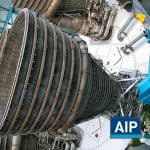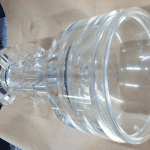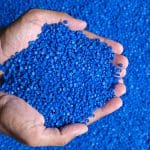An Informational Brief on Polymer Machining
Copolyester elastomers (COPE) are high-performance, high-temperature elastomers that have several properties of thermoset rubber with the processing ease of engineering plastics. One of these thermoplastic elastomers (TPC-ET) is DuPont’s HYTREL®. It is known for toughness, tear resistance and good flex fatigue along with good chemical and temperature resistance. For these reasons, it is an excellent general engineering thermoplastic for everyday to mission critical applications.
AIP has over 37 years of experience machining complex components from thermoplastics like HYTREL® thermoplastic elastomer. In this insightful technical brief, we will discuss what goes into machining HYTREL® and how it differs from other manufacturing options such as metal machining, injection molding, and 3D printing.
Properties of HYTREL®
Machinists should keep data on the properties of the thermoplastics they use. This aids in selecting the right material for a project. Also, it helps determine if the material is a good candidate for the end-use. Below are some of the key characteristics of HYTREL® TPC-ET:
Key Properties
- Excellent Flex Fatigue
- Excellent Strength
- Flame Retardant
- Fluid Resistance
- Hydrocarbon Resistance
- Hydrolysis Resistance
- UV Resistance
Description
HYTREL is a brand name for TPC-ET (thermoplastic polyester elastomer). HYTREL comes in several different grades, such as heat stabilized, UV protected, hydrolysis-resistant and flame retardant.
Characterized by excellent strength and flex fatigue while being resistant to hydrocarbons and most fluids, HYTREL can be utilized within a wide range of engineering applications.
The table below displays an overview of the material properties, units and values for machining HYTREL® 5556:
| Material Property | Units | Value |
| Tensile Elongation at Break @73 F | % | 560 |
| Flexural Modulus of Elasticity @ 73 F | psi | 30000 |
| Tensile Modulus of Elasticity @ 73 F | psi | – |
| Flexural Strength @ 73 F | psi | – |
| Specific Gravity @73 F | ASTM D792 | 1.20 |
| Tensile Strength @73 F, (ult)/(yld) | psi | 1000 (5%) |
| Notched Izod Impact @73 F | ft-lb/in of notch | No Break |
| Heat Deflection Temperature @ 264 psi | F | 120 |
| Flammability Rating | UL94 | HB(3.05mm) |
| Coefficient of Linear Thermal Expansion @73 F | in/in/F | 6.5E-05 |
| Dielectric Strength, Short Term | Volts/mil | 410 |
| Water Absorption, Immersion, 24 Water Absorption, Saturation |
% by weight % by weight |
0.30 – |
Applications of HYTREL®
HYTREL’s properties make it a great general purpose engineering thermoplastic. It has qualities similar to thermoset rubber with the machining ease of engineering plastics. For this reason, it can be found on medical devices, electrical cabling insulation, mechanical gears, automotive components. As a performance thermoplastic, it can flex in multiple directions, cycle after cycle, long after rubber would break.
Common Applications
- Cable insulation and jacketing
- Chassis suspension Systems
- Food Contact Materials
- Innovative Furniture Design
- Mechanical Gears
- Medical Device Materials
- Polymers for Oil and Gas
- Railway Technology for the Long Haul
- Seals and Gaskets
- Sustainability in Airbag Systems
- Thermoplastic Tubing and Elastomeric Hose
- Mobile Phone Housing & Components
- Plastics For Sporting Goods
AIP Machining Capabilities: Unrivaled Expertise
Our close ties with the industry’s leading plastics manufacturers give us even further insight and access to technical help in material selection, sizing and manufacturing procedures. If you are looking for a trademarked material for your project, we have a host of material bases available for expert machining. Whatever your application, our machinists can help you in material selection, sizing and manufacturing techniques from concept to completion.
Our Suppliers
We machine DuPont’s HYTREL® and HYTREL® resin at AIP Precision Machining. If you have a question about the grade we use or machining specifications for this brand, our machinists are happy to help you.

Machining HYTREL®
Annealing HYTREL®
As with any CNC machined part, annealing and stress-relieving is crucial to the machining process. Coolants, lubricants and trained procedures prevent cracking and crazing in a precision machined component. We recommend slow heating and cooling during the annealing process of thermoplastics. This reduces the chances of these stresses occurring from the heat generating during machining polymers like HYTREL®. Our AIP machinists use computer controlled annealing ovens for the highest quality precision temperatures and time control. If you have a specific question about the annealing process for HYTREL® or other thermoplastics, our machinists at AIP can provide an in-depth consultation.
Machining HYTREL®
HYTREL® can be injection molded, extruded or thermoformed. At AIP, we CNC machine HYTREL® and HYTREL® resin. For the best results, use sharp tools, avoid excessive clamping and cutting forces and use coolants to prevent overheating. We recommend non-aromatic, water-soluble coolants because they are most suitable for ideal surface finishes and close tolerances. These include pressurized air and spray mists. Coolants have the additional benefit of extending tool life as well. These are general machining guidelines. For further information, speak to a CNC machinist at AIP to get specific machining information on HYTREL® and other performance thermoplastics.
Some companies machine both metals and plastics, which has detrimental outcomes for machined polymer products. Many past experiences have shown parts going to customer without cracks, only to develop surface cracks and warping over time due to exposure to metal machine shop fluids. Be sure to use a facility like AIP that only machines polymers.
Preventing Contamination
Contamination is a serious concern when machining polymer components for technically demanding industries such as aerospace and medical sciences. To ensure the highest level of sanitation down to the sub-molecular level, AIP Precision Machining designs, heat-treats, and machines only plastics with any sub-manufactured metalwork processed outside our facility. This allows us to de-risk the process from metallic cross contamination.
HYTREL® Machining Guide: Supportive Information
Quality Assurance Certifications
Miscellaneous Materials
Looking for more machining guides on thermoplastics from supplier DuPont?






